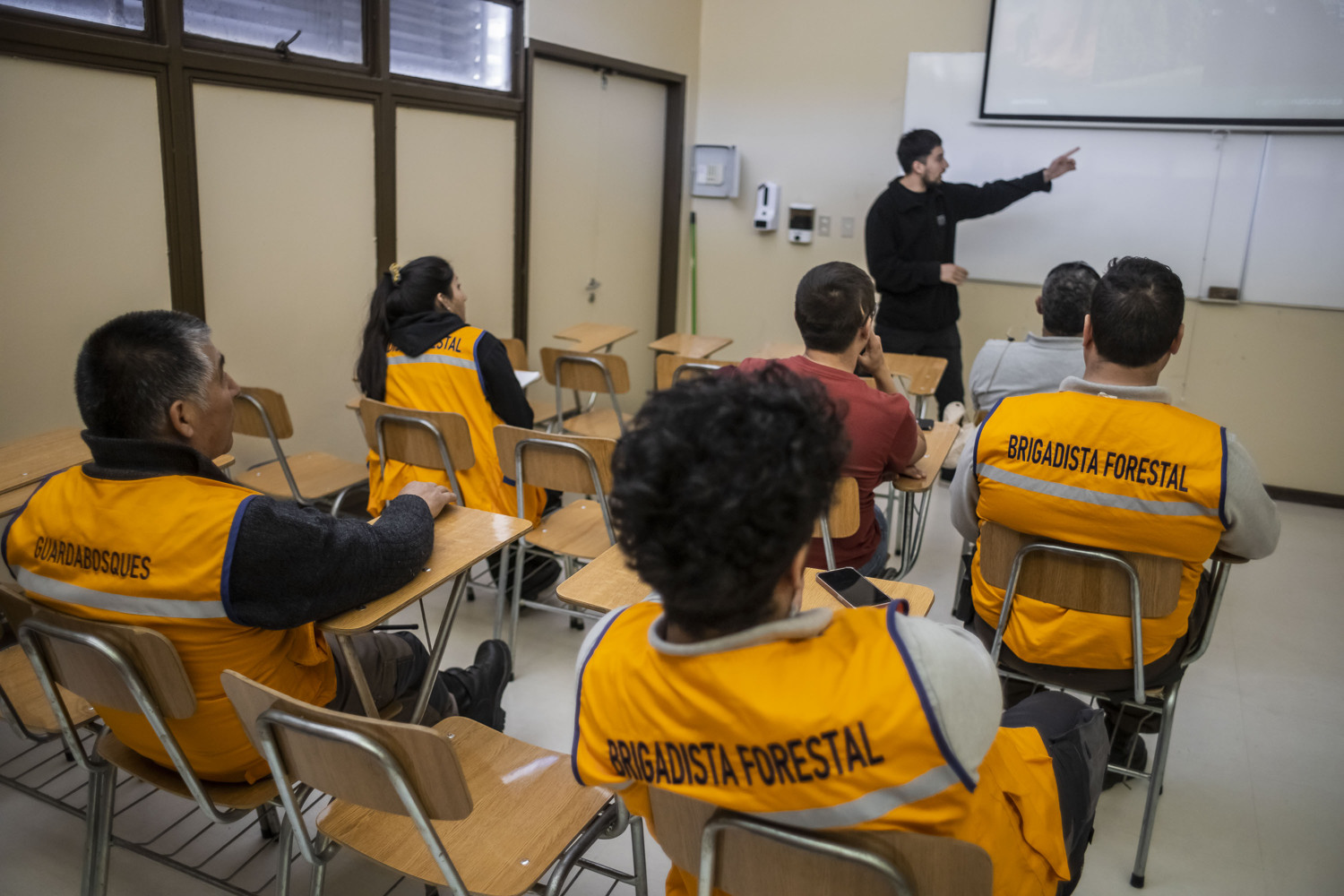UdeC Forest Firefighters Trained in Native Ecosystem Protection

Relevant knowledge regarding the identification and protection of threatened flora and fauna species, among other topics, was the focus of the training for the UdeC Forest Fire Brigade conducted by professionals from the Campus Naturaleza project. The forest firefighters play a crucial role during this summer season and are also responsible for guarding the areas adjacent to the main campus and preventing actions that could lead to a forest fire.
Identification of pitao, naranjillo o michay araucano, among other native tree species, were part of the topics in which the University of Concepción Forest Firefighters were trained. Professionals from the Campus Naturaleza project discussed these and other aspects related to the protection of a unique and irreplaceable ecosystem that exists just minutes from the city and the Heritage Campus of the University of Concepción.
The UdeC Forest Fire Brigade prevents and, if necessary, combats the initial fire outbreaks around the university before the arrival of firefighters or external teams during the summer season. In this context, the UdeC Property and Forest Management Officer, Juan Emilio Espinoza Carvajal, stated that “the forest fire brigade is indeed the first line of response. They have a prevention protocol, a combat protocol, and therefore, they are the ones who will ultimately identify any risk situations that may exist, whether forest fires, risks to the fauna we have, or threats to endangered species, among others. They are always on the ground, conducting surveillance rounds, and they are the ones who will alert us in case of any emergency or situation.”
He added that this initiative was very significant, “since the brigade has the role of protecting all this natural heritage that we have at the University of Concepción, which now forms part of the Campus Naturaleza project. We hope this is the first of many training sessions where Campus Naturaleza can support the forest brigade. As the brigade feels more identified and trained, they will be able to act more effectively because they will understand the role they are playing and what we are truly protecting,” he emphasized.
Biodiversity
The Conservation Manager of the Campus Naturaleza UdeC project, Silvana Campos Villavicencio, expressed during the training that "native forests are distributed in small remnants, which reflect the progressive fragmentation and habitat loss that has occurred locally. Currently, there are multiple pressures due to their location in the urban-forest interface of Greater Concepción."
He explained that all threats make the fragments of native ecosystems and the species that inhabit them highly fragile and vulnerable, and that they therefore require effective conservation measures and prevention of risks associated with human beings.
The remnants found within the project area correspond to the Deciduous Forest of Concepción, an ecosystem transitional between species inhabiting the central and southern regions of the country. For this reason, its characteristics are unique and not found elsewhere, with species such as the naranjillo, classified as Vulnerable (VU) according to Chile's Species Classification Regulation (RCE), indicating a high risk of extinction in the wild. Similarly, the pitao and the Araucanian michay shrub are also present, both facing a very high risk of extinction, categorized as Endangered (EN).
Regarding existing fauna, the Conservation Engineer of Natural Resources stated, "The use of camera traps or tracking devices and acoustic recorders are non-invasive methods to detect the presence or absence of fauna, enabling us to establish a standardized and georeferenced baseline of the species inhabiting the area. The gathered information allows for studying daily or seasonal behavioral patterns of the species, conducting biodiversity estimates and analyses, and observing trends and changes in site usage."
In the same vein, Valentina Valeria Macaya, UdeC forest firefighter, member of the Fire Department, and Marine Biologist, stated, "It's important to take care of the forest, fire prevention, because here we have endemic species, species found only in this part of Chile." She also emphasized that fire prevention is a crucial aspect for protecting the existing native ecosystems near the university. "My role as a firefighter can contribute in some way to conserving the UdeC's heritage, and it's something that helps me grow as a biologist," she concluded.
The Forest Brigade consists of seven members who conduct patrols at different times throughout the day on the grounds adjacent to the UdeC Heritage Campus to detect possible suspicious activities by individuals and thereby prevent incidents, among other tasks. They are also responsible for implementing emergency protocols as necessary, within the university's plan framework, which began in November and will remain active until April 2024.


